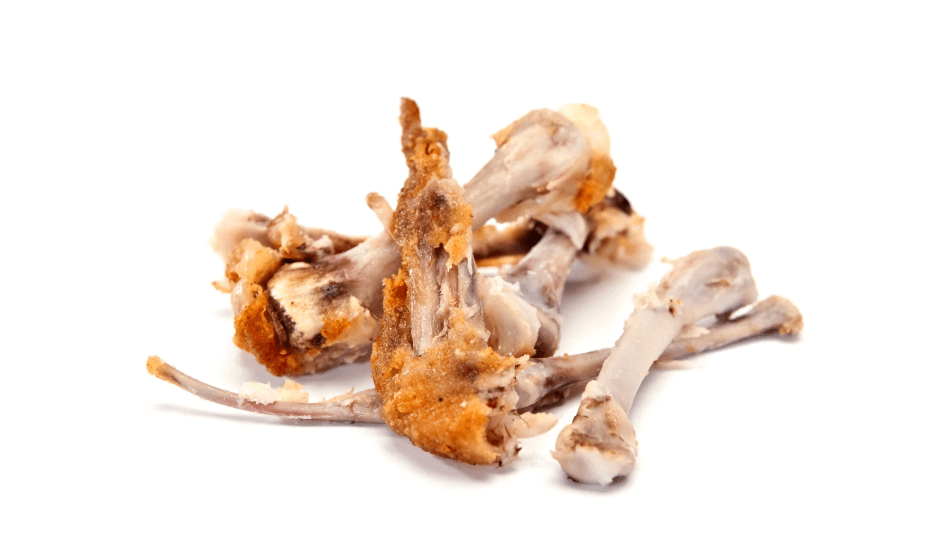Cooked Chicken Bones
Never feed cooked chicken bones to your pet—splinters can puncture organs, spark infection, or block the intestines.

When chicken bones are chewed, they can break into sharp pieces that may injure the mouth, esophagus, stomach, or intestines. These splinters can also puncture the digestive tract, allowing bacteria and food particles to leak into the abdominal cavity. This can lead to peritonitis (inflammation of the abdominal lining) or even sepsis (a dangerous bloodstream infection).
Because bones are hard to digest, they may also cause blockages in the digestive system. In severe cases, this becomes a life-threatening emergency.
Raw Chicken Bones — Are They Safe?
Some people believe raw chicken bones are safe because they are softer and easier to chew. However, risks still remain:
- Sharp fragments can still form and injure the digestive system.
- Raw chicken may contain harmful bacteria that cause severe stomach infections.
Even if your pet swallows a small amount without immediate symptoms, feeding chicken bones is always considered unsafe.
What to Do If Your Pet Eats Chicken Bones
- Stay Calm — Swallowing a bone does not always lead to problems. In many cases, the bone passes through naturally. However, you should still monitor your pet closely.
- Observe Carefully — Watch for symptoms such as vomiting, abdominal pain, lethargy, blood in stool, or changes in appetite. If you notice any of these, contact a veterinarian immediately.
- Support Digestion — Feeding soft, easily digestible food and ensuring plenty of water can help move the bone through the digestive tract more smoothly.
What the Vet Might Do
- Examination: Check your pet’s condition and look for signs of internal damage or blockage.
- X-ray / Ultrasound: Determine whether bones are stuck or causing injury.
- Surgery: If the bone is trapped and cannot pass naturally, surgical removal may be necessary.
- Medication: Prescribe antibiotics or anti-inflammatory drugs if infection or inflammation is present.
- IV Fluids: Provide fluids to prevent dehydration and support recovery.
Possible Complications
If chicken bones cause internal injury or obstruction, your pet may face serious complications such as:
- Peritonitis: Inflammation of the abdominal lining caused by puncture or leakage.
- Sepsis: A dangerous infection in the bloodstream that can spread rapidly.
- Intestinal Obstruction: A blockage preventing food and waste from moving, leading to severe pain and vomiting.
- Internal Damage: Sharp fragments cutting or tearing the digestive organs.
Warning Signs to Watch For
Contact a vet immediately if your pet shows any of these signs after eating bones:
- Abdominal pain or bloating
- Vomiting or diarrhea
- Blood in stool
- Loss of appetite
- Constipation or inability to pass stool
- Lethargy or weakness
- Difficulty breathing
Intestinal Blockage Explained
An intestinal blockage occurs when part of the digestive system becomes blocked or narrowed, preventing normal digestion. This can happen if bone fragments become stuck, or if swelling occurs in the intestines.
Blockages are emergencies and require immediate medical attention.
Summary:
Chicken bones are one of the most dangerous foods for dogs and cats. They can splinter, puncture organs, cause severe infections, or block the intestines. Even if your pet seems fine, it’s best to monitor them closely and contact a veterinarian if you notice any abnormal behavior or symptoms.